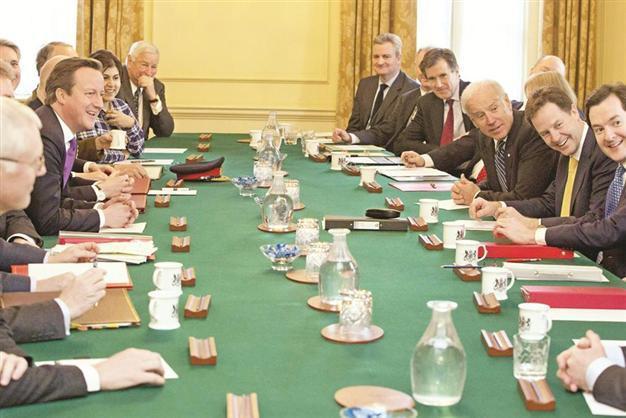British PM’s authority wanes, but gay marriage passes
LONDON

Britain’s PM Cameron chairs a briefing attended by US Vice President Biden. He hails the approval of same-sex marriage as ‘a step forward.’ AFP photo
The U.K.’s Parliament voted heavily in favor of legalizing gay marriage on Feb. 5, but Premier David Cameron’s authority in his own party took a blow as his Conservatives split in two over a measure that he himself had championed.In the first of several votes required for its passage, the lower house of Parliament backed the legislation by 400-175, but more than half of Cameron’s 303 lawmakers voted against or abstained, signaling deep backbench unease with it and his leadership. The bill will have to go through more detailed parliamentary debates and a vote in the House of Lords, where a vote in favor is likely given the strong support. If it becomes law, the proposed bill would enable same-sex couples to get married in both civil and religious ceremonies, provided that the religious institution consents. The bill would also allow couples who had previously entered into civil partnerships to convert their relationship into a marriage.
Many Conservative lawmakers denounced the legislation, saying it was morally wrong, not a public priority, and unnecessarily divisive, threatening a corrosive legacy of bitterness.
Conservative lawmaker Gerald Howarth told Parliament that the government had no mandate to push through a “massive social and cultural change.” “This is not evolution, it’s revolution,” said Edward Leigh, another Conservative member of Parliament, saying marriage was “by its nature a heterosexual union.”
Although the vote went Cameron’s way, many analysts believe he will now have to address a deep seam of discontent running through his party. He made a last minute statement ahead of the vote, arguing gay marriage would make society stronger. He later hailed the result as “a step forward for our country.”
Amid talk of a possible leadership challenge to Cameron, many Conservative lawmakers say the prime minister is sacrificing core party values on the altar of populism. “He hasn’t got a lot of political capital left in the bank,” Stewart Jackson, a Conservative lawmaker who opposes the gay marriage bill, told Reuters. “He has to deliver some authentic Conservative policies very soon.”
Such talk is rife among some Conservative lawmakers and follows a spate of articles in the British press in which a handful of lawmakers raised the possibility of ousting Cameron - a prospect most commentators regard as far-fetched - before the next election in 2015.
In a sometimes emotional debate, several gay lawmakers from different parties took to their feet to commend the bill, describing the prejudice they had suffered growing up. “Millions will be watching us today,” said Nick Herbert, a gay Conservative lawmaker. “Not just gay people but people who want to live in an equal society.”
The vote was warmly welcomed by Cameron’s junior coalition partners, the Liberal Democrats, and by the opposition Labour party. The bill is still many stages away from becoming law, and some of its opponents called on Cameron after the vote to consider amending it to appease their concerns, promising they would try to frustrate its progress through Parliament.
















